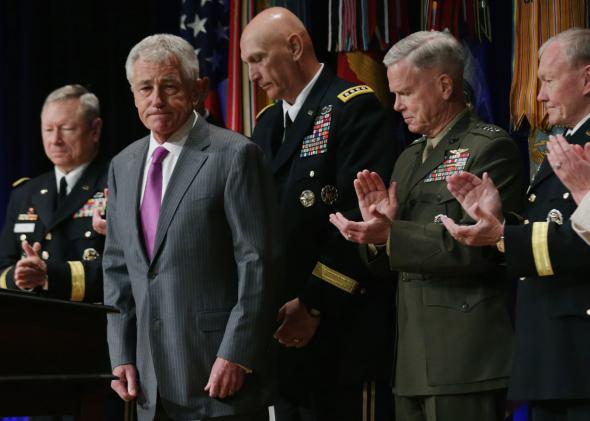In the waning years of “don’t ask, don’t tell,” the Pentagon stopped bothering to defend the ban on openly gay service. Spokespeople either blamed Congress for forcing them to fire badly needed service members during wartime or simply uttered platitudes about treating all those in uniform with respect and dignity.
But the ban on transgender service, which survived the 2011 repeal of DADT, is not mandated by statute. So it’s harder for the Pentagon to blame anyone other than itself for wasting talent and making a mockery of its professed commitment to diversity and the dignity of its force. That commitment was trotted out most recently in a Pentagon ceremony this week in which a revised Department of Defense Human Goals Charter integrated gays and lesbians into its language on diversity and inclusion.
Defense Secretary Chuck Hagel went out of his way to tout the progress. “I’m proud that the language of the charter has been updated to reflect the contributions of gay and lesbian military personnel who now serve openly and proudly across America’s armed forces,” he said at the signing. “We will continue striving to make military service a model of equal opportunity for all regardless of race, color, sex, religion, sexual orientation, or national origin.”
And here I must pause to say that I, too, am proud of this progress and very glad that the military and the nation have done the right thing at long last. But Hagel made a point of holding up the military as a “model of equal opportunity for all,” which makes the continued ban on transgender service, the rationale for which is quickly crumbling, increasingly untenable.
The Pentagon uses that word—untenable—too, in its oddly robotic response to anyone who questions the rationale for its trans ban. But the Pentagon says that it is trans service that is untenable, not its bogus rationalization for prejudice. Asked by the Washington Blade why its newly signed Human Goals Charter excludes “gender identity,” spokesman Lt. Cmdr. Nathan Christensen said that “service members must serve in austere environments, many of which make necessary and ongoing treatments related to sex reassignment and many other conditions untenable. Policies on military personnel and health care regarding transgender members are intended to meet the needs of the services, which include the ability to deploy to and serve in austere environments with limited (and perhaps no) access to medical care for prolonged periods.”
The assumption is that transgender people would, across the board, require excessive medical treatment that would unduly burden the military or that would incapacitate its trans troops if not supplied. But a report co-authored by former Surgeon General Joycelyn Elders and other military and medical experts shows that’s just not true. The report, which found that “there is no compelling medical rationale for banning transgender military service,” estimates that if the transgender ban were lifted, “fewer than 2 percent of transgender service members, a total of 230 individuals, would seek gender-confirming surgery each year,” and, of these, even fewer would experience complications that could affect their fitness for duty.
As for hormone use, current policy singles out transgender people for disqualification, even as the military fully tolerates personnel who have conditions that can require hormone replacement. The report further indicates that “110,000 active-duty Army troops last year were taking prescribed antidepressants, narcotics, sedatives, antipsychotics and anti-anxiety drugs” and that “1.4 percent of all US service members (approximately 31,700 service members) reported prescription anabolic steroid use during the previous year, of whom 55.1% (approximately 17,500 service members) said that they obtained the medications from a military treatment facility.”
How do you explain the blanket ban on transgender service, based on the idea that some transgender personnel may require burdensome medical treatment, while current policy allows all kinds of non-transgender personnel to serve even if they require the same or more burdensome medical treatment? Why, you become a robot. When the Washington Post asked the Pentagon for a comment for its recent front-page story on Landon Wilson, a highly trained sailor who lost his job for being trans, spokeswoman Lt. Col. Cathy Wilkinson said, “Service members must serve in austere environments, many of which make necessary and ongoing treatments related to sex reassignment and many other conditions untenable.” Sound familiar?
When I contacted the Pentagon’s public affairs office to point out that this rationale was itself untenable, given all the burdensome medical needs the military tolerates among non-transgender personnel, I first got this response: “At this time there are no plans to change the department’s policy and regulations which do not allow transgender individuals to serve in the U.S. military.” When I explained that my question was not about whether there were plans to change the policy but why such an inconsistent policy existed in the first place, I got this response: “Policies on military personnel and health care regarding transgender members are intended to meet the needs of the services, which include the ability to deploy to and serve in austere environments with limited (and perhaps no) access to medical care for prolonged periods on little or no notice. … Service members must serve in austere environments, many of which make necessary and ongoing treatments related to sex reassignment and many other conditions untenable.” (OK, maybe a real robot wouldn’t have repeated “austere environments.”)
Landon Wilson was a cryptologic technician, a talented, respected, expensive national security asset with the highest security clearance, whose job was to intercept communiqués from foreign extremists plotting to harm America. The Pentagon has no good reason to get rid of him, and every reason to keep him, along with other transgender members who want nothing more than to serve their country as themselves. Military leaders should have to answer to the American public for its twisted policy that wastes talent like Wilson’s. And the commander in chief, who took a strong stand against anti-gay discrimination in the military, should, too.
